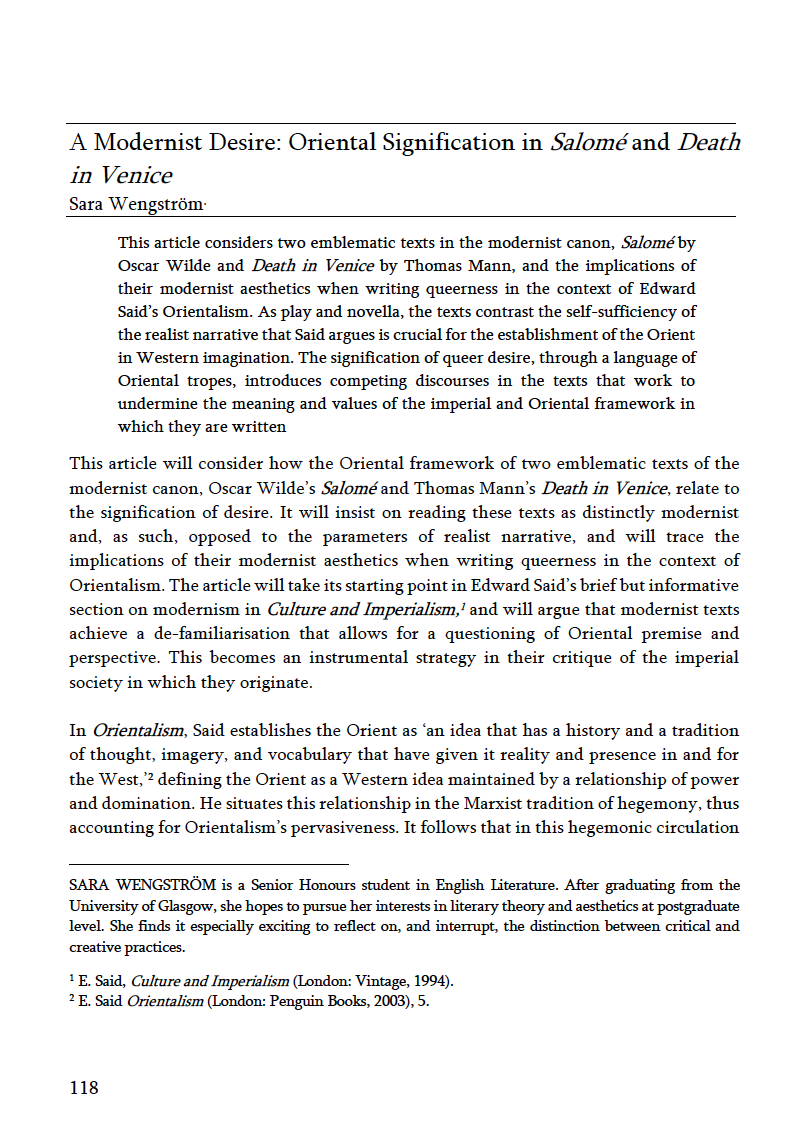A Modernist Desire
Oriental Signification in Salomé and Death in Venice
DOI:
https://doi.org/10.36399/GroundingsUG.9.202Keywords:
Orientalism, Queerness, Salomé, Death in Venice, Oscar Wilde, Thomas Mann, Edward SaidAbstract
This article considers two emblematic texts in the modernist canon, Salomé by Oscar Wilde and Death in Venice by Thomas Mann, and the implications of their modernist aesthetics when writing queerness in the context of Edward Said’s Orientalism. As play and novella, the texts contrast the self-sufficiency of the realist narrative that Said argues is crucial for the establishment of the Orient in Western imagination. The signification of queer desire, through a language of Oriental tropes, introduces competing discourses in the texts that work to undermine the meaning and values of the imperial and Oriental framework in which they are written
References
T. Mann, Death in Venice (1912; trans. Michael Heim, New York: Ecco, 2004).
O. Wilde, Salomé (1893; Paris: Flammarion, 1993).
E.K. Bauer, ‘Penetrating Desire: Gender in the Field of Vision in Thomas Mann’s Der Zauberberg and Christian Schad’s Graf St. Genois Anneaucourt’ (2009) 101 Monatshefte 483-498.
Y. Im, ‘Oscar Wilde’s Salomé: Disorienting Orientalism’ (2011) 45 Comparative Drama 361-380.
T. Kontje, ‘Germany’s Local Orientalisms’ in J. Hodkinson and J. Walker (eds.) Deploying Orientalism in Culture and History: from Germany to Central and Eastern Europe (New York: Camden House, 2013), 55-78.
D. N. Prager, Orienting the Self: The German Literary Encounter With the Eastern Other, (Rochester, New York: Camden House, 2014).
N. Mirzoeff, ‘Disorientalism Minority and Visuality in Imperial London’ (2006) 50:2 TDR: The Drama Review 52-69.
E. Said, Culture and Imperialism, (London: Vintage, 1994).
E. Said, Orientalism, (London: Penguin Books, 2003).
E. Showalter, ‘The Veiled Woman’ in Gender and Culture at the "Fin de Siècle’ (London: Bloomsbury, 1991) 144-168.
J.P. Wilper, ‘Wilde and the Model of Homosexuality in Mann's Tod in Venedig’ (2013) 15(4) CLCWeb: Comparative Literature and Culture. Available at: http://dx.doi.org/10.7771/1481-4374.2305 [Accessed 24.10.2015].

Published
Issue
Section
License
Copyright (c) 2016 Sara Wengström

This work is licensed under a Creative Commons Attribution 4.0 International License.
The CC BY 4.0 license is a Creative Commons license. This is a non-copyleft free license that is good for art and entertainment works, and educational works. It is compatible with all versions of the GNU GPL; however, like all CC licenses, it should not be used on software. People are free to: Share — copy and redistribute the material in any medium or format; Adapt — remix, transform, and build upon the material for any purpose, even commercially. The licensor cannot revoke these freedoms as long as you follow the license terms. But they must conform to the following terms: Attribution — You must give appropriate credit, provide a link to the license, and indicate if changes were made. You may do so in any reasonable manner, but not in any way that suggests the licensor endorses you or your use. No additional restrictions — You may not apply legal terms or technological measures that legally restrict others from doing anything the license permits.
Please check individual article PDF copies to see if any additional restrictions apply.







